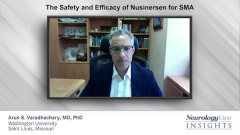
Importance of Compliance and Multidisciplinary Management in SMA
An expert neurologist emphasizes the importance of medication compliance and the value of multidisciplinary management in meeting patient goals of therapy for spinal muscular atrophy.
Episodes in this series

James Wymer, MD: After you’ve started the patient, either on oral therapy or the intrathecal therapy, one of the single most important issues, and it’s especially true for the oral because you’ve got to take it every day, is compliance. It’s staying on the medication if you want to get the sustained benefit. Much of your time will be spent counseling the patient on the importance of taking the medication as it’s directed and taking it for a lifetime. This becomes a problem with the teenagers because they may be reluctant to do that as they get into their teenage years. With adults, it’s easier. You monitor the compliance by periodically calling them, touching base with them. What we like to do is see our patients periodically for their comprehensive multidisciplinary meetings and then we’ll talk with them. “How are you doing on the medication? Are you having any [adverse] effects? What are those [adverse] effects? Is there a way we can help to control, to limit those adverse effects?” If it’s GI [gastrointestinal] can we adjust the timing of the medication to control that? How do we need to try to improve the adverse effects so that the patients are tolerating it because it is important to stay on those medications? If they have difficulty staying on it and we have to consider switching to a different one, we want to go through that discussion we had before. If you’re on the oral therapy and maybe you have some problems with compliance, then you have to switch to the alternative of the intrathecal, which carries its own issues, with the injections as a concern.
One of the key parts of treating spinal muscular atrophy, after you get somebody on the medication and they’re staying on the medication, which is helping to stabilize the disease, is developing a multidisciplinary approach to try to improve their function. What we will talk about with these patients is they may have some diseased nerves and muscles, but they also have some functioning nerves and muscles, and you want to enhance that functioning. For those who are having problems functioning, you want to find ways to compensate for that. That’s why it is critical that while they’re going through this treatment, they get involved with physical therapy, occupational therapy, pulmonary therapy, speech and language pathology. This type of multidisciplinary approach, which is going to be individualized to that patient, is what will help to further improve [any potential] benefit. In our clinic we do this as a group. The patient will come in on a day and will be seen by whichever of those specialists [is needed] the same day, so we can all come together as a group and discuss what is the optimal therapy for that patient. What is the individualized personal therapy that’s going to work for them? We will use other health care providers if they are needed. We talk about compliance, and if we need to get their primary care physician involved to help us out with that, we may contact them and include them in the loop.
The way I describe it to my patients is, in the center you have the patient, and surrounding the patient is their core group of family, friends, people involved in their care. And outside of that group are all your different specialists, which include your neurologist, your primary care physician, your physical therapist, your speech and language pathologist, your occupational, your respiratory therapist. Nobody is at the top, nobody is at the bottom; we are all working together to develop this comprehensive program, and that’s what’s important in the multidisciplinary management of this disease. You develop that program, it gets the patient vested in the care, the patient is working to get better. We’re helping to develop a program that as they go through their lifetime with the different stages of the disease, we can help to address those stages, those disabilities, improve function, improve quality of life.
Transcript Edited for Clarity
Newsletter
Keep your finger on the pulse of neurology—subscribe to NeurologyLive for expert interviews, new data, and breakthrough treatment updates.





















